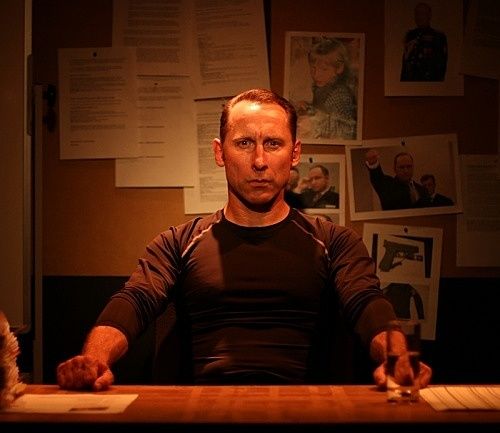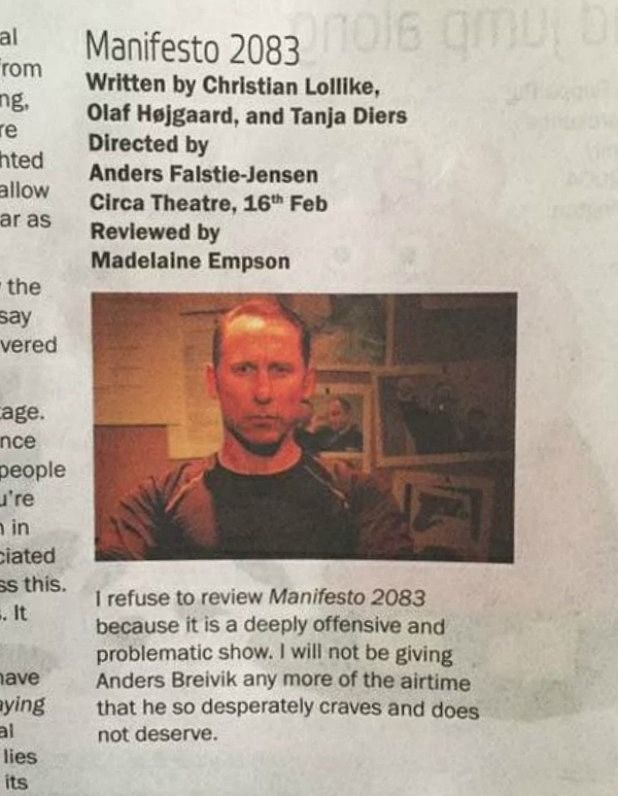Anatomy of a Non-Review: On Responding to 'Manifesto 2083'
Nothing like a good old criticism stoush. Last week a reviewer from Wellington’s Regional News, Madelaine Empson, sparked fury when she viewed a play at Circa theatre and refused to publish a review.
Nothing like a good old criticism stoush. Last week a reviewer from Wellington’s Regional News, Madelaine Empson, sparked fury when she watched a play at Circa theatre and refused to publish a review. The play was Manifesto 2083, directed by Anders Falstie-Jensen and performed by actor Edwin Wright. It focuses on playwright Olaf Højgaard’s obsession with understanding what drove Anders Breivik, the Norwegian mass murderer who killed over 70 people in Oslo and the island of Utøya in 2011. In the play, Højgaard studies Breivik’s 1500-page manifesto in order to better understand him, and that soon grows into a fascination – Højgaard copying the way Breivik lived and embodying him on stage.
Stuff picked up the story of the reviewer’s refusal and published this piece on Saturday quoting Empson and Wright. This is Wellington Theatre Editor Adam Goodall’s response to that article – a version of which first appeared on social media.
I didn’t like Manifesto 2083. I said as much here. It’s an irresponsible and self-absorbed piece of theatre, one too preoccupied with defending its own existence to offer any sustained, real analysis of the rise of the white Christian nationalist right and 'responsible' society's role in enabling and perpetuating it. It gives Breivik’s thoughts a barely-contested platform so that it can obsess over the performance of monstrosity, throwing out questions like “Am I your useful idiot?” as if the asking constitutes actual insight. (It doesn’t).
I can respect that people found it terrifying, though. I can respect that there were a lot of people who were disturbed and shocked by the things they were being shown, who didn’t realise or know how to recognise the depth and entrenchment of fascist, genocidal thought in the West. Manifesto does help you recognise it, at least.
I also understand the Regional News reviewer Madelaine Empson’s position to 'refuse' to review it (even if the expressed act of refusal is itself an act of reviewing). Obviously I don't share that position, because I did review it, but I can understand why someone would be so angered by a show like Manifesto on a conceptual basis that they would refuse to give it oxygen. After all, if you’re producing a work which involves the staging of verbatim excerpts of a white supremacist mass murderer’s manifesto (which anyone can access online) under the pretense of a character onstage ‘understanding’ him; if you’re producing a work that involves handing out flyers to the people of colour in the room outlining a proposal for their systematic genocide - you should be prepared for some people to get pretty mad at you for doing it.
Violence can live onstage just as much as joy can; the how is just as important as the what, though.
Theatre can be an incredibly effective safety valve and site of social exploration. Violence can live onstage just as much as joy can; we can talk together about fascism as much as any other subject. The how is just as important as the what, though, perhaps even more so when tackling a subject as thorny, as live and as dangerous as what motivates a fascist to murder. You need to be clear about what questions you’re asking, you need to be clear about whom you’re asking, and you need to be very clear about how you’re asking those questions. ‘Starting a conversation’ is easy; adding something meaningful to it is harder.
I don’t think Manifesto 2083 is clear on any of those things, and I don’t think it adds anything meaningful to the conversation. Which is part of the reason why I wanted to respond to three different comments made by Manifesto’s sole performer Edwin Wright in the above Stuff article in response to Empson’s decision. I wanted to respond to them here because I think they illustrate a broader problem with the show and the intentions behind it. Wright begins:
Here's the thing; someone could write a full review of the play without identifying Breivik once...she wrote a two-sentence non-review, her justification of which being not giving him 'airtime', and yet managed to name him in under 40 words.
You can't write a review of this show without mentioning Breivik. The show directly grapples with his legacy as an example of a growing movement, and it tries to do that by having Olaf Højgaard obsess over him and embody him so as to understand him. Breivik emerges from Højgaard as a body, berates his host, delivers an eerie monologue recounting the early moments of the Utøya massacre. The circumstances of Breivik's radicalisation, and Højgaard’s obsession with and relationship with the idea of Breivik, are so pivotal to this show that to write about it without mentioning Breivik is to deny all that happens on that stage but the vaguest statements about white supremacy. That's bad criticism and, in this case, it's irresponsible criticism.
The article continues:
Wright said the team struggled to work out how to present the material to the audience, and chose to hand out the flyers, discriminating the audience in the process.
"This was the most powerful way to get the message across. Because they are only handed out to people of different ethnicities, there is a sense that it makes white people complicit (which also makes them uncomfortable). We have even had white people pass these on. In four seasons of presenting this play I have only ever had two women, both of an ethnic race, refuse to accept a flyer."
Handing flyers out to people of colour advocating for their genocide is an act of violence. Pointing at those same audience members – ‘in character’ as Breivik – and telling them they will be executed during the radicalisation of the global right is an act of violence. That’s not contestable.
If you’re going to undertake an act of violence against audience members on stage, you need to be damn sure that what you’re saying with that act is important and necessary and cannot be said any other way. That relies on an acute awareness of the relationship between the performer and the audience. As audience members, we’ll usually do what you tell us. At risk of being dry and business-like, we’ve entered into a transaction with the performer by paying for a ticket and we’ll therefore usually go along with what the performer presents, assuming that there’s a point to that. In this particular case, the audience has assented to watching a man analyse a white supremacist mass murderer.
To then say that handing those flyers out to audience members of colour is an interesting statement about the white audience’s complicity in the action, or that it’s an interesting statement about the passivity of those audience members who accept the flyer, is to deny the context set by that transaction, that relationship, especially when the show never challenges or otherwise shakes up that relationship. I was deeply unsettled by the flyers being handed out – was I wrong to not stand up, tell Wright to get out of here with that shit, and leave? Would Wright have responded to me in the same way that he responded to Empson if I had written a review of the show having walked out?
Manifesto 2083 establishes a conventional performer-audience relationship and then exploits that conventionality to try and make a statement about how easy it is to enable fascism. That’s not powerful theatre. That’s just having power.
(As an aside, this whole exercise is not justified, as Wright suggests, by those two people “of an ethnic race” who refused the flyers. Their rejection of this exercise says nothing about the worth of this exercise, in the same way that people of colour accepting the flyer says nothing about the worth of the exercise).
Wright then goes on to say:
"The irony(?) is that her position clearly illustrates two of the fundamental issues 'plaguing' modern society that Breivik condemns: Political correctness, and censorship."
Hold my beer.
Let’s leave aside that this is neither political correctness nor censorship - Manifesto 2083 didn’t get cancelled and Empson didn't demand that the production company retract the show; all she did is express a deeply-felt objection to the work such that she refused to give it space. Let’s leave that age-old censorship fallacy aside.
At its simplest level, Manifesto 2083 is a set of tools to help you identify right-wing radicalism. To make that show and then turn to the media and say “ironically, someone saying they won’t review my show illustrates that those fascists have a point”? This is where I start to lose my patience. It doesn’t follow that you can stage a play that draws attention to the fuel of fascist hate-speech, then give credence to that hate-speech by using it in your own misguided argument against what you believe to be political correctness gone mad by not getting a review. It is absolutely astounding that someone working on a show like Manifesto can, in good conscience, suggest that someone finding their show repugnant is an illustration of why fascism is on the rise.
Fuck that.
A Post-Script
This Stuff article only really exists because Wright put Empson’s non-review in a public post on Facebook, sarcastically asking alongside it, "Because it’s inconceivable that a piece of theatre, however problematic, may surprise an audience, or offer a perspective that may challenge their preconceived notions of a topic. Right?” That’s his right, obviously, and ideally his friends would have taken the cue to have an actual discussion about what Manifesto does, why someone might find the show reprehensible, and what it means to refuse to review a show. That’s not what happened. The comments that followed – “Ban her”, “Harden the fuck up”, “She's a silly waste of space”, “What a cunt” – were personal, aggressive and infuriatingly gendered. I’ve seen comment threads like this before, practitioners patting each other on the back for having the most aggressive and outraged response to a critic who takes issue with a friend’s work and processes.
I get that it's personal. It's your work and you want to defend it. I've absolutely felt this in the past; anger and bafflement at someone who doesn't 'get' what you're trying to do, who thinks what you're doing is wrong. Sometimes reviewers get it wrong, too – nothing about our work is sacrosanct either, and I've definitely read stuff that's been blinkered or myopic or problematic in its own way. Hell, I've written the stuff – reviews which I wish I could nuke off the face of the internet. But the answer to that isn't to call open season on the reviewer – to sit back as your friends pour venom into your feed (it took a while before Wright finally asked them to be respectful). It’s disingenuous to let fifty of your friends lay into the reviewer on a public social media post and then play the cooler head when the media picks up the story and comes to you for comment.
In the New Zealand theatre community, and in other adjacent communities, we often ask why we don't have a stronger critical culture. We offer up answers like the size of our country and the fact that everyone knows everyone, and sure, these are reasons. Maybe though, we should also start looking at how we respond when the critics don't go our way.
Anders Falstie-Jensen, director and producer of Manifesto 2083, responds to some of the points above:
I fully acknowledge that Manifesto 2083 is a hard watch and that it is disturbing. The scene with the handing out of the assimilation policy is incredibly shocking. And it should be. I disagree with Adam’s suggestion that Edwin is assaulting the audience. He’s not. He’s a performer playing a part and in my opinion audiences are able to see it for what it is; a theatrical device to make the point that the extreme right wing agenda which is globally on the rise, deliberately promotes an agenda with a focus on dividing our society into Them vs. Us. I hope that moment is incredibly confronting for everybody in the audience no matter what their skin colour and that it will make people reflect on what kind of society they want to live in in the future.
What in my mind is crucial to remember is that Breivik didn’t attack refugees or immigrants. He attacked fellow Norwegians that didn’t agree with his political world view. For him their skin colour didn’t even matter as they were all “multiculturalist traitors”. He undoubtedly had severe mental issues and was a loner but the ideology that drove him has crossed into mainstream politics and that has to be addressed. For me, Breivik is a nightmare vision of where this movement can lead our society.
I also feel the play demonstrates how easy it is to become radicalised. We all are, to some extent, with social media outlets that confirm our world view etc. Heck, everything on my Facebook feed is about saving whales, renewable energy and Boosted campaigns for great projects in need of a bit of help. I read the same three papers, and have been doing so for the last 15 years. The play sheds light on a world view that is shared by millions of people and crucially also by people in power (Stephen Bannon for one) and that is really uncomfortable. Recently I befriended an old acquaintance in the US on Facebook who is a hard-core Trump supporter. Having his newsfeed in my mix has been quite an eye opener to the extreme views boiling away not just in the US but also Australia.
The Wellington season of Manifesto 2083 at Circa was the fourth time the work has been staged in New Zealand. We’ve played in Auckland, Nelson and Dunedin. To date nearly a thousand people have seen the play. We’ve spoken to people with direct connections to Utøya and the bomb attack in Oslo who came and saw our production, a person that spent weeks in the court room with Breivik, a school group that Edwin met with the following day to discuss the play. None of them found the production offensive and we have received no complaints from audience members that I am aware of. My email address is in the free programme handed out at every performance and either Edwin or myself are always on hand afterwards, on stage, if people want to talk about the show. Our experience is that lots of people do that because they want to talk and discuss what they seen. Often people that received the flyer stay afterwards to talk to Edwin about that moment too.
When we premiered the play in 2015 at The Basement the European refugee crisis was hitting the media. In quick succession we’ve seen Brexit, Trump, you name it. We are witnessing a huge political upheaval and it’s important to discuss where that can lead us. But also why it’s happening.
As for the online response to the Regional News reviewer, it was never Edwin's intent for her to be set up as a target for personal attacks and abuse and he has personally apologized to her for his failure to appropriately moderate the conversation on his page.
Whether Manifesto 2083 is good play or an offensive one is not for me to say. If future seasons do go ahead I will definitely consider how to frame the play in a larger context. The Utøya attack is a historical fact. We need to be able to talk about why it happened. I think the play is an important part of that discussion. It's one thing to view a quick 2-minute video on Facebook or spending 5 to 10 minutes reading an article online, it’s another to have a very real emotional response (even if it is one of disgust and repulsion) to something as horrific as the Utøya attack by being immersed in a theatrical performance. That is where the play, in my opinion, succeeds.


